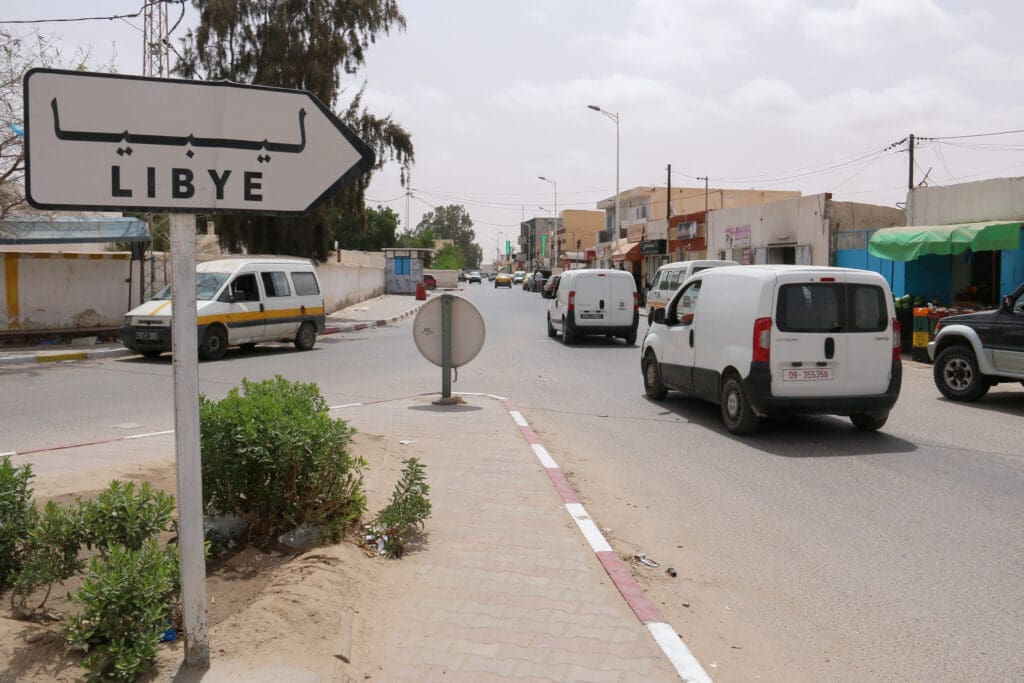Nearly four months after it closed due to armed clashes between rival Libyan groups, the Ras Ajdir crossing with Tunisia finally reopened on July 1. Located 170 kilometers (105 miles) west of war-torn Libya’s capital, Tripoli, the main land crossing into its western neighbor is a vital lifeline for trade—both official and illicit.
But it is precisely the crossing’s economic value that has made it the focus of repeated clashes among the armed groups struggling for power since the 2011 uprising that toppled Libya’s long-time ruler Muammar Gaddafi.
The latest fighting reveals the fragility of the power alliances in western Libya, as political and militia figures driven by a desire to control lucrative resources maneuver between political, military, and religious forces to strengthen their own influence. The struggle for Ras Ajdir also underscores Tripoli’s ongoing struggle to control militia factions that continue to co-opt strategic state assets, including border crossings, for their own gain.
Military and political factions in western Libya covet the Ras Ajdir crossing due to the major profits to be made from trade with Tunisia. In 2023, official trade between Libya and Tunisia totaled about $850 million, while some 3.4 million Libyans and Tunisians crossed for tourism, medical treatment in Tunisia, and trade.
Yet official commerce across the border runs in parallel with a thriving illicit trade in goods and fuel, as well as human smuggling. These serve as a vital economic lifeline for traffickers and small merchants in southeastern Tunisia and several cities on the Libyan side of the border. Authorities in both countries have historically turned a blind eye to this trade as it provides an alternative to much-needed regional development, while a clamp-down on the smuggling of goods would risk sparking social unrest. Indeed, repeated closures of the crossing in the past of severely affected the economically challenged areas around it.
Informal trade between Libya and Tunisia has existed for many decades due to their geographic and historical connections. But the border economy is sensitive to changing political, economic, and security conditions. The 2011 uprisings in both Tunisia and Libya disrupted trade, especially due to the deteriorating security on the Libyan side following Gaddafi’s ouster. One notable repercussion was a jihadist attack on the Tunisian border city of Ben Guerdane in March 2016, reportedly launched from Libya. Increased security measures to address the instability on the Libyan side have led to repeated bouts of unrest, protests, and violence in the border areas.
The overthrow of Gaddafi’s regime and the fragmentation of Libya’s central authority prompted many local factions to compete for control of strategic sites and installations in order to secure larger shares of Libya’s economic resources. The frontier city of Zuwara, inhabited by an Amazigh majority and excluded from the border economy during Gaddafi’s era, emerged as a key player. Its militias seized the Ras Ajdir crossing and annexed it to the Zuwara municipality, transforming the city into a significant power center. Although nominally under the control of Tripoli’s successive governments, Zuwara has since enjoyed considerable autonomy.
Politics, Religion and Ethnicity
More than a decade on, the latest clashes in Ras Ajdir have largely been fueled by the personal ambitions of Libyan Interior Minister Imad Trabelsi, who’s efforts to expand his influence have upset the balance of power in western Libya.
Originally from the city of Zintan and former commander of the Al-Sawaiq militia, Trabelsi sided with eastern Libyan military chief Khalifa Haftar during the 2014-2015 Libyan civil war, but later switched allegiances. In 2018, Prime Minister Fayez al-Sarraj of the Government of National Accord (GNA) appointed him Director of the General Security Service, and in 2022 he assumed the role of Minister of Interior in Abdul Hamid Dbeibah’s Government of National Unity (GNU), which controls Tripoli today. Trabelsi was accused in a 2018 U.S. State Department report of accepting illegal payments on trucks smuggling petroleum products to Tunisia in areas under his control, and was reportedly briefly detained at a Paris airport in 2023 for “carrying a large sum of cash” of unknown origin, before being released.
Trabelsi, backed by Dbeibah, pledged in March to return Ras Ajdir to state control, “even by force,” ostensibly to halt smuggling and restore security. His repeated statements about controlling the crossing have sparked opposition from political forces allied with the Zuwara militias, especially the Supreme Council of the Amazigh of Libya. Its leader, Abdel Hadi Barqiq, has accused Trabelsi of undermining social cohesion and eroding the government’s credibility, saying this could potentially lead to its downfall. Barqiq also said that any military attempt to control Ras Ajdir would mean declaring war on the Amazigh of Libya. This prompted a state of emergency and sparked a mobilization of militias in other Amazigh-majority cities along smuggling routes linked with Zuwara.
To legitimize their military operations to control the crossing, both parties exploited political discourse inciting ethnic and religious division. The GNU’s authority for Islamic endowments (awqaf), dominated by Madkhali Salafists, issued a fatwa calling for the excommunication of the Ibadi sect of Islam, to which most Libyan Amazigh belong. This prompted the Supreme Ibadi Council to condemn the fatwa as a criminal act, threaten a boycott, and propose creating an independent Ibadi endowments body. Recognizing the seriousness of the situation, Dbeibah condemned the authority for “provoking strife” and urged it not to exceed its jurisdiction. Meanwhile, Libya’s Dar Al-Iftaa, another religious institution affiliated with the GNU and led by Sheikh Al-Sadiq Al-Gharyani—a political rival of the Madkhali Salafist movement—accused the authority of following orders from international intelligence agencies aimed at disrupting Libyan religious and societal harmony.
For its part, the Supreme Council of the Amazigh in Libya, which is allied with the Zuwara militias, is using ethnic minority discourse, portraying efforts by Trabelsi’s forces and allies to take control of the crossing as an attack on the Amazigh as an ethnic group. This is despite the fact that the two sides previously fought together in a large military coalition against Khalifa Haftar during his attempt to seize Tripoli by force, from April 2019 to June 2020.
The situation at Ras Ajdir therefore exemplifies the complex and delicate nature of the balance of power in Libya, pitting among forces with multiple affiliations and goals against each other. Such dynamics have prolonged Libya’s political, economic, and security crisis since 2011. Moreover, they consistently provide opportunities for ambitious actors to exploit sectarian and ethnic divisions, further deepening societal rifts—all to serve the political ambitions and pocketbooks of competing leaders.


